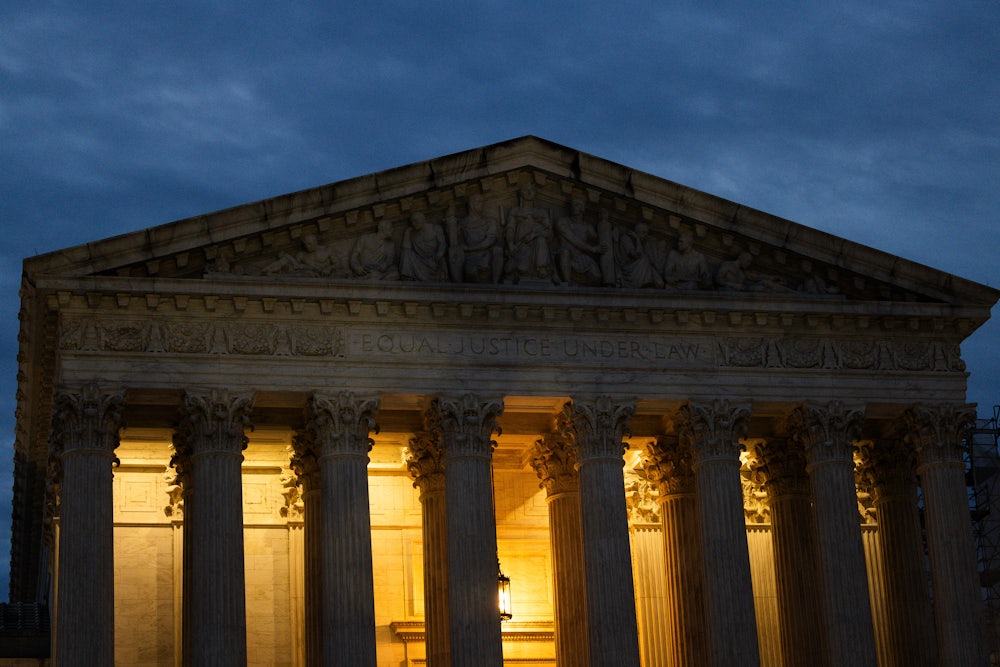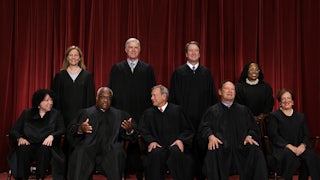The Supreme Court’s campaign to constrain federal agencies continued apace on Thursday in Securities and Exchange Commission v. Jarkesy. In a 6–3 ruling that fell along the usual ideological lines, the court held that the SEC’s ability to enforce civil penalties through in-house hearings was unconstitutional.
Chief Justice John Roberts, who wrote for the court, held that the agency’s practices violated the general constitutional requirement for jury trials in federal civil lawsuits. “The threshold issue is whether this action implicates the Seventh Amendment,” he wrote. “It does. The SEC’s antifraud provisions replicate common law fraud, and it is well established that common law claims must be heard by a jury.”
Justice Sonia Sotomayor, who wrote for herself and Justices Elena Kagan and Ketanji Brown Jackson, denounced the ruling and what she described as “judicial aggrandizement” by her colleagues. “The majority today upends longstanding precedent and the established practice of its coequal partners in our tripartite system of government,” she wrote. “Because the Court fails to act as a neutral umpire when it rewrites established rules in the manner it does today, I respectfully dissent.”
The court’s decision in Jarkesy is inextricable from its broader war against what conservatives have called the “administrative state.” While Thursday’s ruling could have serious implications for how some agencies enforce federal law, as Sotomayor outlined in her dissent, Roberts’s decision is not as disastrous for the executive branch’s ability to enforce federal law as it could have been.
The case began with George Jarkesy, a right-wing radio host and former hedge fund manager. He came under the scrutiny of SEC investigators in the early 2010s for allegedly lying to investors about key aspects of two funds he ran at the time, including the management team, the types of investments, the business partners he worked with, and various asset values. Unsurprisingly, the agency charged him with multiple violations of federal securities laws.
When the SEC charges someone with securities law violations, the agency has two options. Its officials can pursue those charges in the normal federal courts that are created by Article 3 of the Constitution. It can also pursue them through what are known as administrative proceedings, an option that Congress opened up through the Dodd-Frank reforms it enacted after the 2008 Wall Street crash.
What are administrative proceedings? Some federal agencies enforce federal laws through hearings that are overseen by what are known as “administrative law judges,” or ALJs, who serve as in-house adjudicators for the agencies to which they are assigned. ALJs have many (but not all) of the powers of true federal judges, but they are not confirmed by the Senate and they do not serve lifetime terms. Most notably for this case, these administrative hearings do not have juries.
The SEC brought Jarkesy before one such hearing in 2013. The ALJ who oversaw it sided with the agency, imposing a $300,000 fine on Jarkesy and restricting his ability to participate in the securities industry. Jarkesy appealed the decision to the regular federal courts, arguing that the in-house proceedings violated his Seventh Amendment rights to a jury trial. He also contended that the ALJs’ removal protections made them unconstitutional and that the entire enforcement system violated the nondelegation clause. (We’ll come back to those last two claims later.)
Two constitutional amendments protect the right to trial by jury. The Sixth Amendment generally guarantees it for criminal prosecutions in federal courts. The Supreme Court has also applied that amendment’s protections to state courts via the Fourteenth Amendment. In addition, the Seventh Amendment guarantees the right to a jury trial in “suits at common law” in federal courts, which covers many types of civil lawsuits. (The Supreme Court hasn’t extended that one to the states for reasons that aren’t relevant here.)
In his briefs for the justices last year, Jarkesy argued that the SEC’s in-house enforcement system ran afoul of the Seventh Amendment’s guarantees. He noted that civil lawsuits for fraud were part of the common law when the amendment was ratified in 1791. Recounting the ratification debates, Jarkesy claimed that “the Anti-Federalists carried the day in pushing through the Seventh Amendment, in large part to assure that the government could not put citizens to trial for penalties without the intervention of a jury.”
The SEC disagreed. It told the justices that its in-house enforcement system fell under what is known as the “public rights doctrine.” The doctrine is an exception of sorts to the Seventh Amendment, and it can get dizzyingly arcane. In general terms, it allows the federal government to initially pursue civil remedies outside the courts and without jury trials in cases where legislative and executive power is traditionally exclusive. Modern examples include collecting tariffs and levying taxes, interacting with tribal governments, adjudicating patent and pension claims, immigration hearings, and so on.
Jarkesy, for his part, argued that the entire public rights doctrine is unconstitutional. Enshrining that line of thinking would upend how the federal government functions at a basic level. Roberts, writing for the court, declined to go anywhere near that far. He instead ruled that because fraud lawsuits were part of English common law in 1791, the public rights doctrine simply did not apply to them.
“The object of this SEC action is to regulate transactions between private individuals interacting in a pre-existing market,” he wrote for the court. “To do so, the government has created claims whose causes of action are modeled on common law fraud and that provide a type of remedy available only in law courts. This is a common law suit in all but name. And such suits typically must be adjudicated in Article III courts.”
Sotomayor, writing in dissent, sharply disagreed. She described Roberts’s majority opinion as breaking with the court’s precedents. “This Court has [previously] held, without exception, that Congress has broad latitude to create statutory obligations that entitle the Government to civil penalties, and then to assign their enforcement outside the regular courts of law where there are no juries,” she wrote.
One case in particular that Sotomayor cited was the 1977 Atlas Roofing v. Occupational Health and Safety Administration decision, which involved the newly created workplace safety agency. In that case, the Supreme Court unanimously upheld OSHA’s ability to adjudicate safety violations without a jury trial. The justices at the time held that because OSHA’s regulatory power was heretofore “unknown to the common law,” the Seventh Amendment did not apply.
“This case may involve a different statute from Atlas Roofing, but the schemes are remarkably similar,” she wrote. “Here, just as in Atlas Roofing, Congress identified a problem; concluded that the existing remedies were inadequate; and enacted a new regulatory scheme as a solution.”
Roberts read Atlas Roofing differently. He concluded that while the OSHA statute was novel, it was considered so because its health and safety standards “bring no common law soil with them.” It was not merely that the law was new but that it was novel in the common-law context. He also noted that the Supreme Court had already clarified in later cases that not all new regulatory schemes are automatically impervious to the Seventh Amendment.
“The reasoning of Atlas Roofing cannot support any broader rule,” Roberts argued. “The dissent chants ‘Atlas Roofing’ like a mantra, but no matter how many times it repeats those words, it cannot give Atlas Roofing substance that it lacks.” In a footnote, he added that, reading Sotomayor’s dissent, “one might think Atlas Roofing is among this court’s most celebrated cases,” pointing to substantial outside criticism that it received.
Sotomayor went on to cast Thursday’s ruling as part of what she described as a “disconcerting trend” in the court’s recent decisions. “When it comes to the separation of powers, this court tells the American public and its coordinate branches that it knows best,” she wrote. She cited a series of recent rulings by the court that invalidated the ways that Congress and the executive branch had structured various federal agencies.
“Make no mistake: Today’s decision is a power grab,” Sotomayor claimed. “Once again, the majority arrogates Congress’s policymaking role to itself. It prescribes artificial constraints on what modern-day adaptable governance must look like. In telling Congress that it cannot entrust certain public-rights matters to the Executive because it must bring them first into the Judiciary’s province, the majority oversteps its role and encroaches on Congress’s constitutional authority.”
Sotomayor is correct about the broad strokes of the conservative majority’s rulings on the “administrative state.” I’ve also written more generally about its war against novelty in federal policymaking. Unlike me, she has already read the court’s pending decision in Relentless v. Department of Commerce, which represents a much greater threat to democratic governance than this case does. It will be a few more days before we find out if her treatment of the majority in this case reflects the outcome of that one.
At the same time, Roberts’s decision for the court is far narrower than what Jarkesy had sought. By deciding the case on Seventh Amendment grounds, the majority said it was unnecessary to resolve two other questions Jarkesy raised: whether the statutory protections against firing ALJs violate the separation of powers and whether the SEC’s discretion to choose between in-house tribunals and Article 3 courts violated the nondelegation doctrine, the largely moribund doctrine that forbids federal agencies from delegating their core powers to the other branches of government.
That aspect of the decision is not really surprising. The courts, at least in theory, are supposed to avoid deciding unnecessary constitutional questions. Whether the president can fire the SEC’s administrative law judges doesn’t really matter now that they have been deprived of most (if not all) of their duties. And if there’s anything the Roberts court loves more than hearing arguments about the nondelegation doctrine, it is finding ways to avoid ruling on it. But it nonetheless opted for a narrower approach.
Thursday’s ruling does call into question how some other agencies use administrative proceedings and ALJs. Sotomayor listed a few in her dissent that may find their enforcement systems newly scrutinized by the lower courts. Whether that scrutiny will lead to the same outcome is unclear. The public rights doctrine remains largely intact, and the SEC retains the power to pursue securities charges in federal courts. Instead of a flamethrower, the Supreme Court opted in this case for a scalpel.


